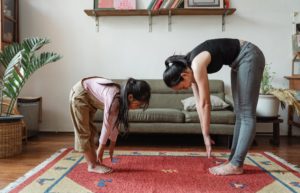 Prolonged Stress: A Secondary Crisis
Prolonged Stress: A Secondary Crisis
If you’ve been following our weekly blogs you’ve probably noticed a reoccurring theme. Judging by the growing statistics and even just within the feedback from our own readers, the topic of stress is a significant one these days. In fact, in regards to the American Psychological Association’s recent Stress in America poll, Arthur C. Evans, Jr., Ph.D. and APA’s CEO states, “This survey reveals a secondary crisis that is likely to have persistent, serious mental and physical health consequences for years to come.” (1) Stress isn’t a new byproduct of COVID-19, but the pandemic definitely increased the severity and likelihood of which Americans deal with stress. Let’s take a look at some statistics that will probably make us all feel a little more normal.
- 82% of adults said they never imagined the coronavirus pandemic would last this long.
- 67% said that living through the coronavirus pandemic has been a rollercoaster of emotions.
- 24% said they or a household member were laid off, while 22% started working from home.
- 16% of all U.S. adults had a child or children age 18 or younger at home for remote learning.
- 85% of those had at least one child still home for remote learning as of February 2021.
- 67% reported less in-person social interaction since the start of the coronavirus pandemic.
In summary, APA’s report reads, “When asked how the level of stress in their life has changed compared with before the pandemic, nearly half of U.S. adults (47%) said the level of stress in their life has increased.” (1)
 Attempting to Cope
Attempting to Cope
In an effort to cope, Americans have developed bad habits leading to a decline in health. Last week we honed in on the impact prolonged stress has had on Americans’ eating and exercise habits (or lack thereof) and included some tips to manage stress in ways that promote a healthy lifestyle. It’s hard to say which came first – unhealthy eating/exercise habits or poor sleep patterns; the two have a type of cause-and-effect relationship and are both largely impacted by high levels of stress. Therefore, on the heels of last week’s blog, this week I’d like to take a look at the negative effects prolonged stress can take on our sleep patterns and ways to combat them.
 Sleep Awareness
Sleep Awareness
Random fact for the day: Sleep Awareness Week was just last week – Sunday, March fourteenth through Saturday, the twentieth. It’s interesting to me that it’s a call to awareness rather than an invitation to a celebration like National Doughnut Day. (Which is June 4th, by the way. You’re welcome.) It’s probably due to the fact that sleep has become a national pain point rather than a national victory. According to the APA survey, two in three Americans, (67%) said they are sleeping more or less than they wanted to since the pandemic started. (1)
 A Sleep-Deprived Body
A Sleep-Deprived Body
Quoted in the Henry Herald article, “How Stress Affects the Way Americans Sleep,” director of the Sleep and Health Research Program, Michael Grandner, states, “One of the reasons sleep is important is that it impacts so many systems in the body.” (2) The article explains, “Not getting enough sleep weakens the immune system, according to the National Sleep Foundation. Numerous studies show inadequate sleep can increase heart disease risks, such as obesity, high blood pressure, and Type 2 diabetes. A recent study in the journal Aging found older adults who got less than five hours of sleep per night doubled their risk for dementia and early death.” (2) Americans tend to overlook the significance of quality sleep in the name of productivity, but the long-term effect of sleep-deprivation on the body is devastating.
 Tips to Better Sleep:
Tips to Better Sleep:
Rudy Mawer, MSc, CISSN, and Atli Arnarson, BSc, Ph.D. walk their readers through some very helpful tips to achieve better sleep in their article, “17 proven Tips to Sleep Better at Night.” (3)
- Increase bright light exposure during the day.
Daily sunlight or artificial bright light can improve sleep quality and duration, especially if you have severe sleep issues or insomnia. - Reduce blue light exposure in the evening.
Blue light tricks your body into thinking it’s daytime. There are several ways you can reduce blue light exposure in the evening. - Don’t consume caffeine late in the day.
Caffeine can significantly worsen sleep quality, especially if you drink large amounts in the late afternoon or evening. - Reduce irregular or long daytime naps.
Long daytime naps may impair sleep quality. If you have trouble sleeping at night, stop napping or shorten your naps. - Try to sleep and wake at consistent times.
Try to get into a regular sleep/wake cycle – especially on the weekends. If possible, try to wake up naturally at a similar time every day. - Take a melatonin supplement.
A melatonin supplement is an easy way to improve sleep quality and fall asleep faster. Take 1-5mg around 30-60 minutes before heading to bed. - Consider these other supplements.
Several supplements, including lavender and magnesium, can help with relaxation and sleep quality when combined with other strategies. - Don’t drink alcohol.
Avoid alcohol before bed, as it can reduce nighttime melatonin production and lead to disrupted sleep patterns. - Optimize your bedroom environment.
Optimize your bedroom environment by eliminating external light and noise to get better sleep. - Set your bedroom temperature.
Test different temperatures to find out which is most comfortable for you. Around 70 degrees F (20 degrees C) is best for most people. - Don’t eat late in the evening.
Consuming a large meal before bed can lead to poor sleep and hormone disruption. However, certain meals and snacks a few hours before bed may help. - Relax and clear your mind in the evening.
Relaxation techniques before bed, including hot baths and mediation, may help you fall asleep. - Take a relaxing bath or shower.
A warm bath, shower, or foot bath before bed can help you relax and improve your sleep quality. - Rule out a sleep disorder.
There are many common conditions that can cause poor sleep, including sleep apnea. See a healthcare provider if poor sleep is a consistent problem in your life. - Get a comfortable bed, mattress, and pillow.
Your bed, mattress, and pillow can greatly affect sleep quality and joint or back pain. Try to buy high-quality bedding – including a mattress – every 5-8 years. - Exercise regularly – but not before bed.
Regular exercise during daylight hours is one of the best ways to ensure a good night’s sleep. - Don’t drink any liquids before bed.
Reduce fluid intake in the late evening and try to use the bathroom right before bed.
 A Core Value
A Core Value
Lately, we’ve all have to make many small decisions over a consistent period of time for the greater good and health of the nation. It has been absolutely astounding to watch our country as a whole create and spread a culture of “doing your part” for the greater good, even if we have differing opinions on exactly what that should look like. According to Dr. Evans’ quote I referenced at the beginning of this article, we are now facing a secondary crisis of prolonged elevated stress levels and the health consequences that come with it. Once again, we need to come together to make a series of small, consistent choices to combat the unhealthy habits we developed in attempts to cope during the pandemic. Making a lot of seemingly small, but healthy choices over time will do exactly that. Not only will we personally benefit from doing so, but we will throw a pebble in the pool of society – creating a ripple effect of managing stress and prioritizing good health.
I’ll leave you with an encouraging quote from Dr. Bryant Adibe as recorded in AMA’s article, “How the Last Year Has Forced Rethinking on Physician Burnout,” “[W]ell-being should be a ‘core institutional value… One that is demonstrated by what we do and through the institutional decisions we make. It is expressed by the factors that we weigh and the impact that they have on the people who work within our organizations and the communities that we serve.” (4)
Please let us know if you have comments or questions, and subscribe to our Email Updates, so that you can be assured to receive Thinking Thursdays TIPs.
Thank you!
Jerry
Jerry L. Stone
Co-Founder/COO
MedicalGPS, LLC
Resources:
- https://www.apa.org/news/press/releases/stress/2021/sia-pandemic-report.pdf
- https://www.henryherald.com/multimedia/photos/how-stress-affects-the-way-americans-sleep/collection_8908ccc7-2a1d-56d9-bd3b-555622c42300.html#8
- https://www.healthline.com/nutrition/17-tips-to-sleep-better
- https://www.ama-assn.org/practice-management/physician-health/how-last-year-has-forced-rethinking-physician-burnout

